Welcome to an extra stop on the Brews and Choos project.
Brewery: Fox Tale Fermentation Project, 120 E. Santa Clara St., San Jose, Calif.
Train line: Caltrain, San Jose Diridon
Time from Chicago: about 4½ hours by air
Distance from station: 1.5 km
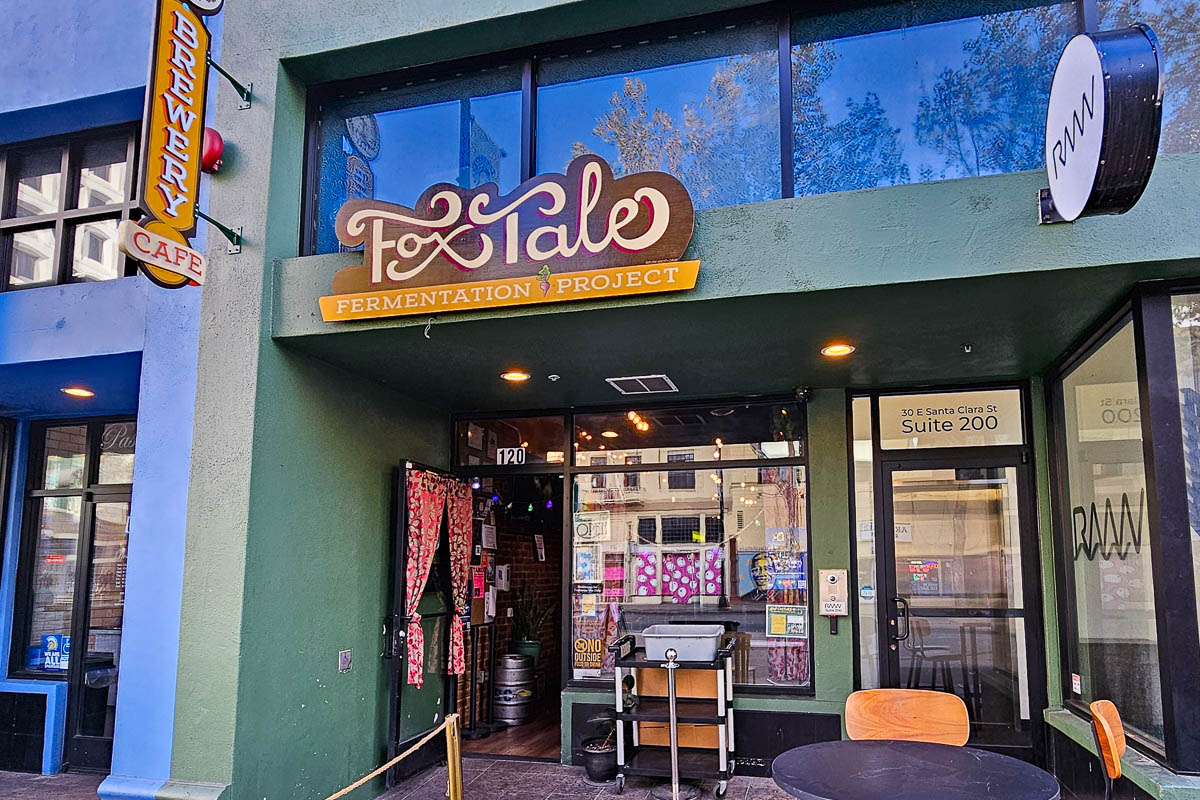
I hadn't intended to visit Fox Tale, because a different brewery was closer to my hotel. But that brewery closed abruptly in November, though no one had updated its Google page. I'm glad I went to Fox Tale instead.
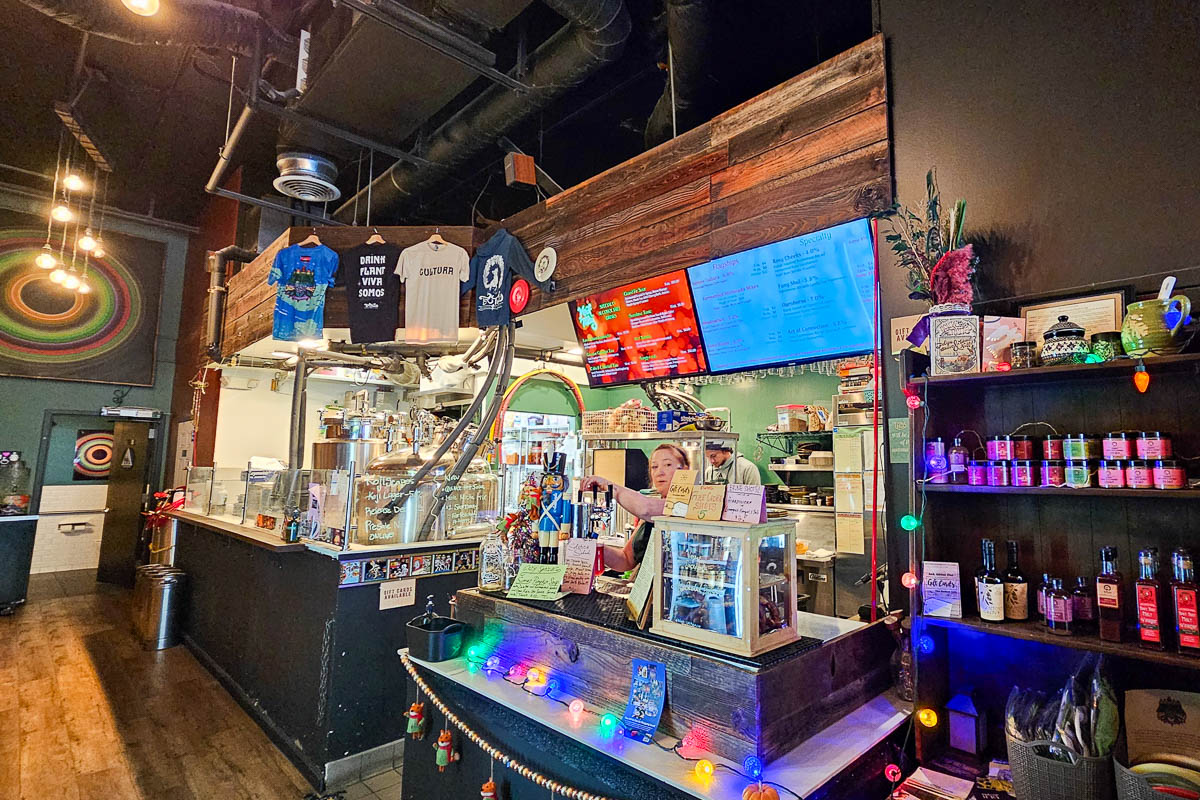
Owners Felipe Bravo and Wendy Neff don't just brew really unusual beers, they also ferment all kinds of foods. The menu has a list of fermented spreads you can put on an order of "just bread." I spread on some garlic-lemon hummus made from parsley oil and sunflower seeds that was truly tasty.

I also tried two beers. The Meadowtate, a rustic pale ale (5.2%) made from fir tips and Hallertau Blanc hops, had a lightly funky nose, tasted more like a lager than an ale, but had a complexity with notes I couldn't identify from the plants they added. The Super Sonic Bloom double-dry-hopped IPA (6.3%) had a really interesting, complex flavor, again with notes that eluded my vocabulary. I would try both them again.
I travel to the Bay Area a lot, as longtime readers know, so I will stop in Fox Tale again.
Beer garden? Sidewalk
Dogs OK? Outside only
Televisions? No
Serves food? Yes
Would hang out with a book? Yes
Would hang out with friends? Yes
Would go back? Yes
The weekend was exceedingly busy, so I haven't had time to post the two Brews & Choos reviews from California as promised. I hope to get to that today. Stay tuned.
I just got back from a 35-minute walk around downtown San Jose, Calif., including a 1-km stretch of the Guadalupe River trail. My Garmin track gives you hints about how it went, particularly the 300 meters or so along the river under multiple overpasses including the California 87 freeway. And in fairness, it's sunny and 13°C, which doesn't suck for the first day of winter.
That said, this is the place where I joined the trail:
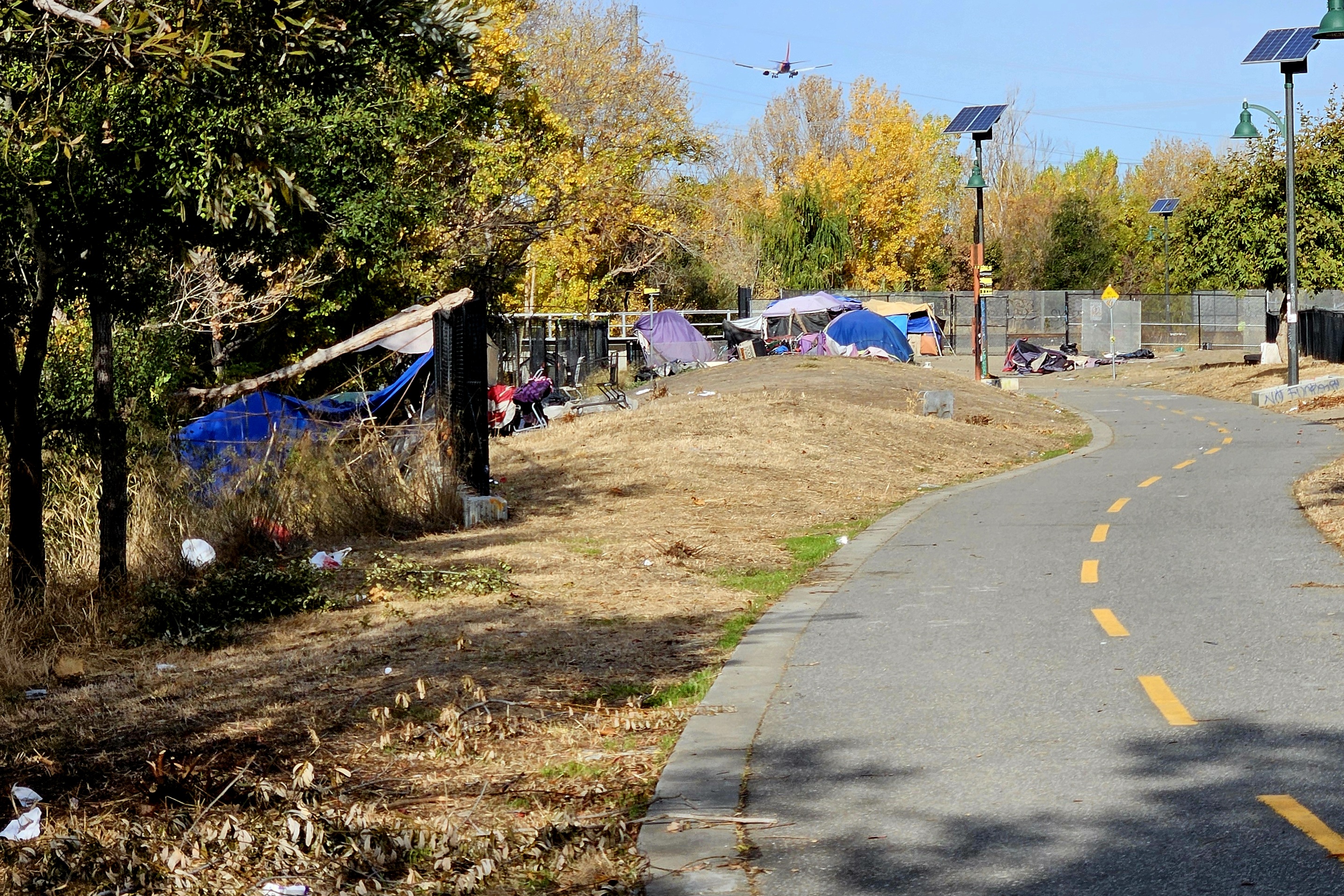
And this is the 87 underpass:
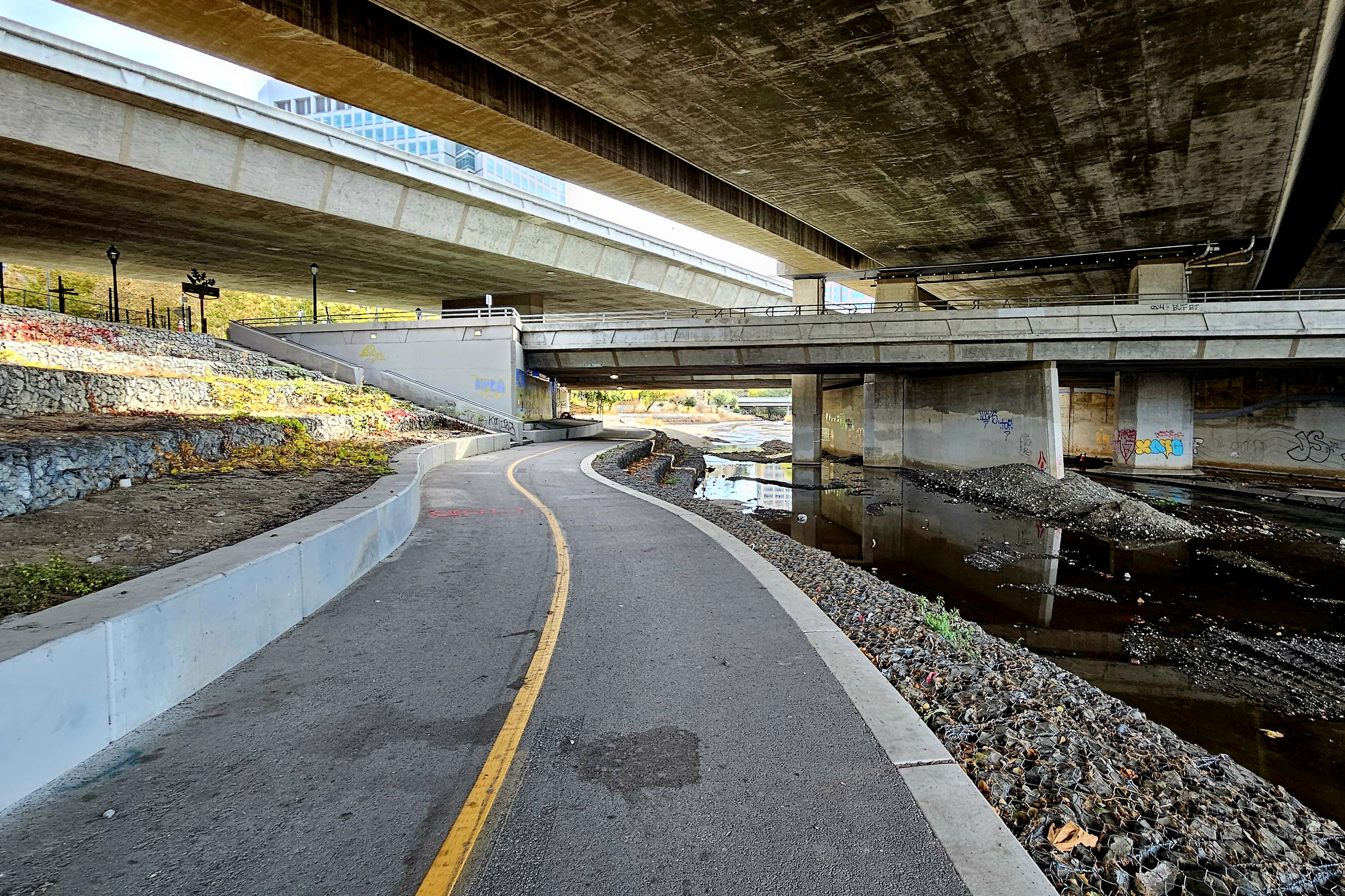
Not shown above, the homeless man launching large rocks onto the bike path, who only stopped when he finally made eye contact with me, which I didn't break until a support column broke it for me. And let me tell you, that eye contact had behind it every single one of my 30+ years of living in New York City and Chicago.
I mean, there are worse places to be homeless than in the Bay Area. But my 30-minute walk through multiple homeless encampments and god-awful car-centric urban infrastructure brought clarity to arguments I've read about California's housing and property-tax policies. For the most progressive state in the union, California has the worst land use. The Bay Area has a huge homeless population only in small part due to the weather. I walked past a 3-bedroom, 163 m² house 25 minutes from downtown San Jose last night, for sale at $1.8 million. A comparable house in my neighborhood would cost about $900k, and it's a 15-minute train ride to the Loop in one of the most walkable places in the world. (The $1.8-million house is just not walkable.)
One more thing. My Clipper Card has $3.05 on it, down from $20 yesterday because it took two trains to get from SFO Airport to San Jose (still much better than renting a car!). But I thought ahead, and set to auto-reload when it goes below $10. Did you know that it takes at least 24 hours to reload a Clipper Card? So I must ask the Metropolitan Transportation Commission, what the hell is the point of the auto-reload feature if it allows the Clipper Card to bottom out, forcing you to reload at a kiosk while waiting for the f****g auto-reload?

The MTC claims "[i]f you set up Auto-Reload for cash value, when your balance falls below $10, Clipper will automatically reload you card when you pay your next fare," but will it happen today? I guess I'll find out when I go to lunch later.
Unrelated: My Garmin watch said I got eight hours of "poor, non-restorative" sleep last night, and "you may feel more tired or irritable today." Nah, I'm fine.
The universe, following up on the death of one controversial right-wing figure in American politics, continued tidying up with the death of former Justice Sandra Day O'Connor (I/r), the first woman appointed to the United States Supreme Court:
Very little could happen without Justice O’Connor’s support when it came to the polarizing issues on the court’s docket, and the law regarding affirmative action, abortion, voting rights, religion, federalism, sex discrimination and other hot-button subjects was basically what Sandra Day O’Connor thought it should be.
When President Ronald Reagan named her to the Supreme Court in 1981 to fulfill a campaign promise to appoint the first female justice, she was a judge on a midlevel appeals court in Arizona, where she had long been active in Republican politics, though she had friends in both parties. Fifty-one years old at the time of her nomination, she served for 24 years, retiring in January 2006 to care for her ailing husband. As the court moved to the right during that period, her moderate conservatism made her look in the end like a relative liberal.
“Liberal” was undoubtedly not her self-image, but as the court’s rightward shift accelerated after her retirement — her successor, Samuel A. Alito Jr., was notably more conservative — she lamented publicly that some of her majority opinions were being “dismantled.”
O'Connor did write reasonable opinions, but her "balance" took the Court much farther to the right than her obituaries suggest. She also voted in the majority on a number of 5-4 decisions of dubious (or worse) jurisprudential reasoning, decisions the current feral reactionaries on the Court use to bolster their worse jurisprudential reasoning.
Presidents Reagan and Bush Sr nominated her and Justice Thomas (R$) as total F-yous to their demographic groups, too. At least O'Connor "evolved" somewhat, though her "evolution" mostly occurred after Justice Alito (R) took her seat. Funny how that works.
So: two complex but historic American politicians who made the world worse died in two days. I wonder if there will be a third?
Speaking of people who made the world worse, this just in: 311 Representatives, including 105 Republicans, voted to boot Rep. George Santos (R-NY) back to Queens a few minutes ago. The Republicans voting Aye really, really, did not want him to run for re-election in such a close district, I guess.
Former Secretary of State Henry Kissinger has died. Of course every news outlet has an obituary, but Spencer Ackerman's in Rolling Stone pretty much nails it—"it" being a nail in Kissinger's coffin:
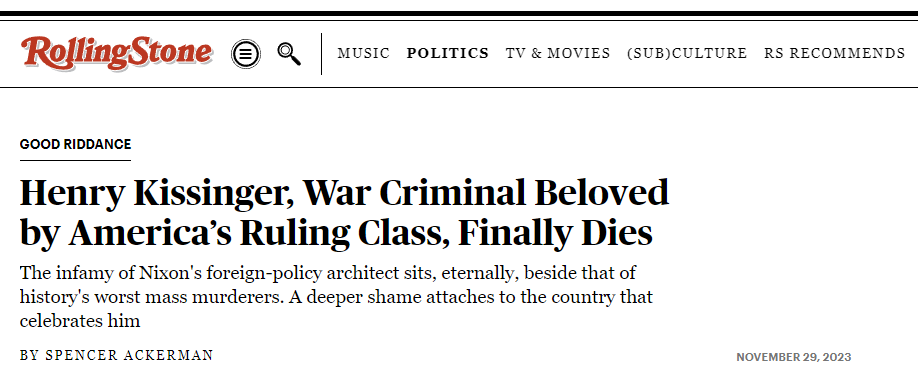
Measuring purely by confirmed kills, the worst mass murderer ever executed by the United States was the white-supremacist terrorist Timothy McVeigh. On April 19, 1995, McVeigh detonated a massive bomb at the Murrah federal building in Oklahoma City, killing 168 people, including 19 children.
McVeigh, who in his own psychotic way thought he was saving America, never remotely killed on the scale of Kissinger, the most revered American grand strategist of the second half of the 20th century.
The Yale University historian Greg Grandin, author of the biography Kissinger’s Shadow, estimates that Kissinger’s actions from 1969 through 1976, a period of eight brief years when Kissinger made Richard Nixon’s and then Gerald Ford’s foreign policy as national security adviser and secretary of state, meant the end of between three and four million people. That includes “crimes of commission,” he explained, as in Cambodia and Chile, and omission, like greenlighting Indonesia’s bloodshed in East Timor; Pakistan’s bloodshed in Bangladesh; and the inauguration of an American tradition of using and then abandoning the Kurds.
“The Cubans say there is no evil that lasts a hundred years, and Kissinger is making a run to prove them wrong,” Grandin told Rolling Stone not long before Kissinger died. “There is no doubt he’ll be hailed as a geopolitical grand strategist, even though he bungled most crises, leading to escalation. He’ll get credit for opening China, but that was De Gaulle’s original idea and initiative. He’ll be praised for detente, and that was a success, but he undermined his own legacy by aligning with the neocons. And of course, he’ll get off scot free from Watergate, even though his obsession with Daniel Ellsberg really drove the crime.”
Not once in the half-century that followed Kissinger’s departure from power did the millions the United States killed matter for his reputation, except to confirm a ruthlessness that pundits occasionally find thrilling. America, like every empire, champions its state murderers. The only time I was ever in the same room as Henry Kissinger was at a 2015 national security conference at West Point. He was surrounded by fawning Army officers and ex-officials basking in the presence of a statesman.
I'm listening to the BBC's coverage of Kissinger's death as I write this, and it's a bit more balanced than American coverage. The Economist got a bit more fawning, The Guardian's news reporting tried for balance, but editorially (e.g., Simon Tisdall) they align more with Ackerman. Former National Security Adviser Ben Rhodes pulls no punches either.
Labour chancellor Alistair Darling also died, but he didn't kill millions, so we'll just let him rest in peace.
A while ago, I posted two constitutional amendments I'd like to see, to set term limits for the Supreme Court and for Congress. I also proposed an amendment to make the Justice Department independent of the other three branches of government.
Monica Lewinsky proposes six new amendments, including getting rid of the Electoral College and—well, an old amendment:
The most fundamental underpinning of a democracy is the fact that those who govern are chosen through free and fair elections. Especially heads of state. The Electoral College ain’t it. State electors are appointed by methods determined by each state’s legislature. That makes it an inherently political system that detracts from the very heart of democratic governance. Moreover, the Electoral College was derived from a mindset that sought to protect slavery, so it is high time for it to go.
And while we’re at it—because you might be a woman or have a daughter, or, ya know, be a decent human being—let’s wedge in amendments such as the long-languishing Equal Rights Amendment, along with one that would reassert a woman’s right to reproductive freedom.
All of this does make me wonder what our Constitution and Bill of Rights would have looked like had they been created by founding mothers instead of fathers.
They all seem pretty sound to me. But my proposal to make Justice independent would obviate hers to make the President unable to stop a prosecution against himself.
Tomorrow I have a quick trip to the Bay Area to see family. I expect I will not only continue posting normally, but I will also research at least two Brews & Choos Special Stops while there. Exciting stuff.
And because we live in exciting times:
Finally, if you're in Chicago tonight around 6pm, tune into WFMT 98.7 FM. They're putting the Apollo Chorus performance at Holy Name Cathedral in their holiday preview. Cool! (And tickets are still available.)
I guess not all of the stories I read at lunchtime depressed me, but...well, you decide:
One happy(-ish) story, as I didn't have to travel this past weekend: the TSA reported that on Sunday they screened more people (2.9 million) than on any single day in history. And of the 100,000+ flights scheduled between Wednesday and Sunday, carriers cancelled only 201 (0.2%). Amazing.
Crain's Chicago Business reported this morning on the precipitous decline in performing-arts audiences (sub.req.) since March 2020:
Chicago arts and cultural organizations emerged from COVID-19 lockdowns, virtual performances and fully masked audiences to slow-to-return patrons, reduced ticket sales and scaled-backed productions. A decline in subscription rates, shockingly higher costs, and donations that haven't kept pace with inflation have thrown some arts organizations off balance and spiraled others into crisis.
Museums, music and dance venues have bounced back faster. Theaters struggled, perhaps, due to the expense and complexity of producing and staging plays.
One widespread explanation: People are still holed up at home in their pandemic pajamas binge-watching "The Bear" and "Ted Lasso." Or they're amusing themselves with YouTube videos. On the other hand, music fans will pay thousands to see a Taylor Swift extravaganza.
Even when audiences show up, they're buying tickets at the last minute. That makes for a white-knuckled ride for theater planners. And with theater-goers forgoing subscriptions, there's less money upfront as a cushion. In the long run, that could make planners less inclined to take a risk on a controversial or innovative work.
Between 2019 and 2022, average in-person attendance at performing arts events plunged 59% to 13,104, with theaters being the hardest hit, according to the DCASE study. "We were the first to close and the last to reopen," says PJ Powers, artistic director at TimeLine Theatre. "You can't just flip on the lights and you're back."
I've served as president of the Apollo Chorus of Chicago since September 2020. Let me tell you, it's bad. We're all suffering. I have meetings with venues that want the same amount we paid them (or more) in 2018, but we just don't have the audience. We're working on how to increase our funding, but until we get corporate sponsorship or major donations from people who love us, we have to go to smaller venues and perform works with smaller instrumentation. (Last spring, for example, we performed Rossini's Petite Messe Solennelle, whose orchestration includes two pianos and a harmonium.)
So. Anyone want to donate $50,000 to a nice non-profit chorus? We'll put your name top of the program.
Butters goes home tomorrow. If she understood the concept of "future," she might look forward to seeing her family again. This morning, however, she did not like getting snowed upon, will not like getting snowed upon after lunch, and will quite happily bogart Cassie's blanket until then, thank you very much:

Yesterday I stopped by two breweries for the Brews & Choos Project; reviews coming later today and early tomorrow.